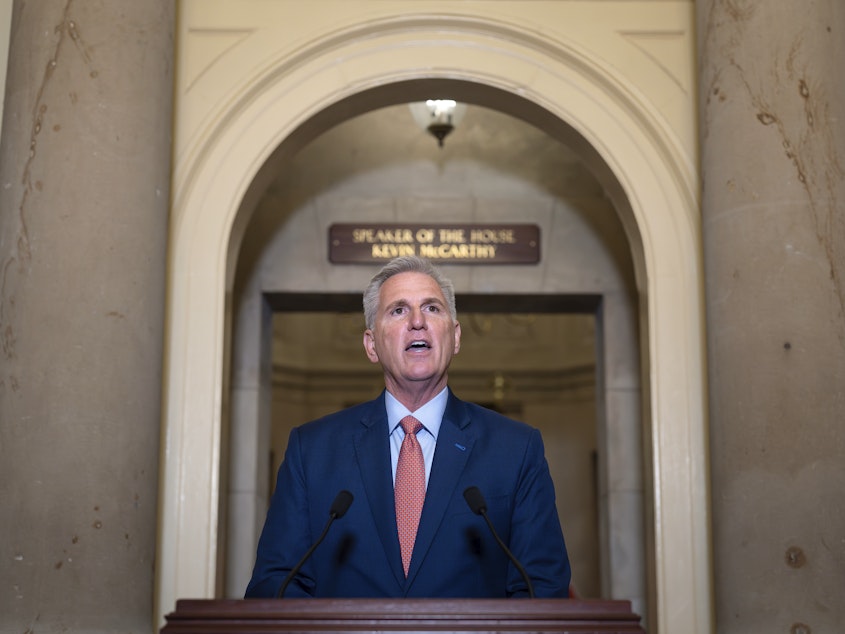Republicans run a big risk with impeachment

House Speaker Kevin McCarthy announced this week that he is directing the chamber he runs to open an impeachment inquiry into President Biden.
But for what exactly?
McCarthy claimed that GOP investigations "paint a picture of a culture of corruption" and that the "allegations of abuse of power, obstruction and corruption ... warrant further investigation by the House of Representatives."
In reality, though, to this point, there has been no evidence that the president has benefited financially from any of his son Hunter's business dealings – and, as prior impeachments have shown, Republicans risk a potential backlash because of perceived overreach.
What's going on here?
Sponsored
McCarthy called the impeachment inquiry a "logical next step."
And it is.
But not from a substantive standpoint.
The right-wing of the House GOP, which is increasingly the mainstream of the conference, has McCarthy in something of a vise. The California Republican only has a four-seat majority, and he has had to continuously throw bones to those on the right, who can torpedo virtually anything he wants to do – and they don't exactly have much interest in a functioning federal government in its current state.
Impeachment, though, is a mighty big bone. And it's still clearly not enough for McCarthy's most extreme members.
Sponsored
The government is set to run out of funding by the end of the month and is careening – once again – toward a shutdown. And despite McCarthy's impeachment posture, Rep. Matt Gaetz of Florida floated the idea of a motion to oust him if McCarthy doesn't follow through on slashing spending the way he and others on the right want.
"If you want to file a motion to vacate, then file the f‑‑‑ing motion," McCarthy said at a closed-door House GOP meeting per Florida Rep. Brian Mast.
McCarthy acknowledged his pique when talking to reporters.
"I showed frustration in here," he said, "because I am frustrated, frustrated with some people in the conference."
The risk
Sponsored
Hunter Biden was indicted this week on gun charges. The special counsel in charge of the case says the younger Biden lied on a federal form that he had not been using drugs at the time of applying for the gun and is being charged for possession of that weapon (for 11 days).
More charges, related to Hunter Biden's taxes and his business dealings, could be coming soon. This points to the possibility that there could be a trial in a presidential election year when his father is running for reelection. That and the impeachment inquiry certainly bring risk for the president's campaign.
On the one hand, it all could serve to muddy the waters and give former President Trump a talking point against President Biden, as his MAGA allies on Capitol Hill are hoping.
But there is also tremendous risk, arguably more risk, for Republicans, especially if people see the GOP as going too far. The GOP brand already isn't great with high unfavorable ratings, and impeachments can serve to benefit the president being charged or investigated because their base rallies around them.
That certainly was the case for Bill Clinton and Democrats in 1998 as impeachment seemed inevitable. Democrats picked up five House seats in the midterms that year, an unusual feat for a president's party.
Sponsored
Clinton's approval rating jumped 9 points, all the way up to 73%, from before he was impeached to immediately after, according to Gallup.
Now, the months following did take a toll on Clinton. His approval dropped 20 points down to 53% before rebounding. Clinton left office with a remarkable 66% approval.
Former President Trump also benefited initially as well. His approval jumped 8 points after his first impeachment, from 40% to 48%.
That, of course, didn't last.
His myriad scandals and controversies meant his hyperpartisan approval reverted to the mean, and after Jan. 6 and his second impeachment, Trump left office with a 34% rating.
Sponsored
Richard Nixon wound up resigning before he could be removed from office – with just a 24% rating.
Much of whether impeachment will matter depends on whether Americans believe an impeachment inquiry is valid. And surveys currently indicate that fewer Americans think one is valid now, as compared to when Democrats were investigating Trump.
So, this is an area in which Republicans – who are already in danger of losing the House in 2024, are in the minority in the Senate and may have a presidential nominee who has proved toxic with the middle – have to tread carefully with many of the party's more moderate members wringing their hands. [Copyright 2023 NPR]



